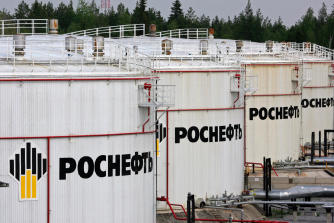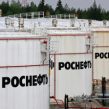
Moscow Advocates Modernizing the Russian Oil Sector
Publication: Eurasia Daily Monitor Volume: 8 Issue: 39
By:

Russia plans to modernize its oil production sector, notably state-owned companies, by pursuing international energy partnerships. The Kremlin has increasingly prioritized modernization and innovation slogans. On January 31, President Dmitry Medvedev said Russian state-owned companies, including oil giant Rosneft, should do more to pursue a modernization and innovation agenda. Executives in state-run companies that fail to modernize should be replaced, Medvedev said (Interfax, RIA Novosti, January 31).
However, on the same day Medvedev’s economic aide, Arkady Dvorkovich, clarified such statements by saying that Rosneft CEO, Eduard Khudainatov, would not be fired (Interfax, January 31). In September 2010, Khudainatov replaced Sergei Bogdanchikov, who had served as Rosneft CEO for 12 years.
Furthermore, Russia’s top officials made it clear they viewed international alliances as a path towards modernization. On January 26, Medvedev said Russia would pursue global energy partnerships, including asset swaps (Interfax, RIA Novosti, ITAR-TASS, January 26). These partnerships, notably new alliances involving Rosneft, would contribute to Russia’s modernization and also help to ensure the country’s energy security, Medvedev told the economic forum in Davos. Also on January 26, Rosneft and BP signed a partnership agreement in Davos (Interfax, RIA Novosti, January 26).
First discussed last fall, the Rosneft-BP alliance was announced earlier in January 2011. On January 14, Rosneft and BP announced a major partnership, including an asset swap (Interfax, RIA Novosti, January 14). The deal, estimated at around $7.8 billion, involved swapping 9.5 percent interest in Rosneft for a 5 percent stake in BP. Both companies also agreed to jointly develop the East-Prinovozemelsky blocs in the Kara Sea at an estimated cost of some $1.5 billion to $2 billion. Rosneft would have a 67 percent interest in the future joint venture and BP would control the remaining 33 percent stake.
On January 20 Prime Minister, Vladimir Putin, hailed the Rosneft-BP partnership. Putin described their planned joint projects in Russia’s oil and gas rich Arctic shelf as a long-term strategic alliance that would attract tens of billions dollars in new investments (Interfax, RIA-Novosti, January 20). Putin voiced his expectation that the alliance would help to develop Russians oil and gas offshore deposits totaling 5 billion tons of oil and 10 trillion cubic meters of gas, he told a cabinet meeting.
Interfax news agency commented that Rosneft-BP alliance followed the Gulf of Mexico disaster last year. In the wake of the oil spill, BP’s market capitalization plunged and the oil major was forced to seek an international alliance, the agency commented (Interfax, January 15).
Reportedly, a 15 percent interest in the state-owned Rosneft was privatized in an IPO in 2006, and another 15 percent stake was due to be privatized by 2015. BP acquired a 1.4 percent stake during the IPO. Following the planned asset swap, BP would have a 10.9 percent interest in Rosneft.
However, the BP-Rosneft share swap was delayed by a lawsuit filed in a London court by TNK-BP’s Russian partners. TNK-BP opposed the Rosneft-BP Arctic shelf exploration deal, saying it violated a shareholder agreement between BP and the AAR consortium, which owns the other half of TNK-BP. The AAR consortium reportedly moved to block a dividend payout of some $1.78 billion in a bid to stop BP’s proposed joint venture with Rosneft (Interfax, January 27-31).
Russian authorities pledged to refrain from meddling in a new corporate dispute. On January 28, Putin’s Spokesman, Dmitry Peskov, said the government would not interfere in the ongoing conflict, adding that the government welcomes the Rosneft-BP alliance (Interfax, January 28).
Meanwhile, on February 1 the High Court in London issued an injunction against the BP-Rosneft deal and ordered a halt to the major share swap and exploration agreement. The deal was blocked until February 25, or until the ruling of the arbitration tribunal in Sweden in accordance with the terms of the TNK-BP shareholder agreement (Interfax, February 1).
The Rosneft-BP alliance was not the only partnership announced in early 2011. On January 27, Rosneft and ExxonMobil signed an agreement on the joint development of oil and gas deposits in the Black Sea. The deal, also signed in Davos, envisages joint exploration and development in the Tuapse area of the Russian shelf (Interfax, RIA Novosti, January 27). Rosneft would have a 66.7 percent interest in the future joint venture and ExxonMobil would hold the remaining 33.3 percent share. The deal was apparently modeled on the Rosneft-BP alliance.
Moreover, on January 31 TNK-BP and Russia’s major petrochemical company, Sibur, announced the expansion of their joint gas processing project. Sibur and TNK-BP agreed to expand their gas processing joint venture, Yugragazpererabotka LLC. The agreement stipulates merging Sibur-controlled gas processing company, Nyagangazpererabotka LLC, into the Sibur-TNK-BP joint venture. As soon as the merger is completed, TNK-BP is expected to increase associated petroleum gas (APG) deliveries to the joint venture from 0.9 billion cubic meters (bcm) in 2010 to over 1.3 bcm by 2013.
Therefore, Russia’s oil sector moved to develop international energy partnerships, apparently following the Kremlin’s orders. However, Russia’s emerging global energy alliances appeared to remain vulnerable to domestic corporate feuds.




